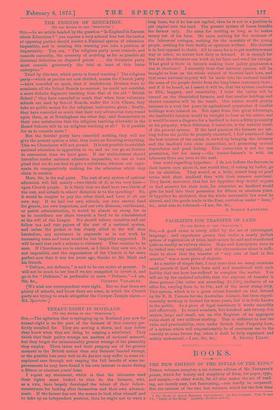TENANT-RIGHT IN SCOTLAND.
(TO THE EDITOR OF THE "SPEOTATOR.1 SIR,—The agitation that is springing up in Scotland just now for tenant-right is on the part of the farmers of that country per- fectly uncalled for. They are sowing a storm, and may before they know what they are doing be reaping a whirlwind. They -think that their paltry wrongs are matters of national moment, but they forget the immeasurably greater wrongs of the peasantry they employ. These latter and their progeny are of far greater moment to the British nation than any farmers' fancied wrongs, or the possible loss some well-to-do farmer may suffer in some ex- ceptional case through not reaping the full benefit of some im- provements he may have found it his own interest to make during .a fifteen or nineteen years' lease.
I repeat my statement, which is that the labourers need -their rights more looked to than do the farmers, who, as a rule, have largely developed the talent of their fellow- countrymen for looking after themselves and their own advance- ment. If the farmer has not the means to look after himself and to take up an independent position, then he ought not to want a
long lease, for if he has not capital, then he is not in a position to put capital into the land. The present system of leases benefits the farmer only. He cares for nothing so long as he makes money out of his farm. He cares nothing for the neatness of the labourers' cottages, nothing for the morality of the young people, nothing for their bodily or spiritual welfare. His interest is in fact opposed to theirs. All he cares for is to get machines some way or other, no matter how dirty or debased. It is enough for him that the labourers can work on his farm and weed his turnips. What good is there in tenants making their paltry grievances a test at elections ? I sincerely trust that national opinion will be brought to bear on the whole subject of Scottish land laws, and that some national inquiry will be made into the national benefit the mass of the people derive from the long leases customary there ; and if it be found, as I assert it will be, that the system conduces to • filth, beggary, and immorality, I trust the tables will be turned on the dissatisfied farmers, and that smaller holdings and shorter tenancies will be the result. Our nation would greatly increase in a very few years its agricultural population if smaller holdings were insisted on. But apart from this great advantage, the landlord's interest would be brought to bear on his estate, and it would be soon a disgrace for a landlord to have a filthy peasantry on his property, which filthiness, I maintain, is the natural result of the present system. If the land question the farmers are set- ting before the public be properly examined, I feel convinced that the best interest of the nation is served by bringing the labourer and the landlord into close connection, and promoting mutual dependence and good feeling. This connection is not for one generation, but for many ;—the tenant-farmer's is with his labourers from one term to the next.
One word regarding hypothec. I do not believe the farmers in their hearts care about it, nor would they, if voting by ballot, go for its abolition. They would, as a body, sooner keep on good terms with their landlord than with their manure merchant. They know, moreover, that but for hypothec they would require to find security for their rent, for otherwise no landlord would give his land into their possession for fifteen or nineteen years. If hypothec be abolished, then the whole mercantile law must be altered, and the goods trade to the East, carried on under " liens," &c., must also be reformed.—I am, Sir, &c.,
A SCOTCH LANDLORD.


































 Previous page
Previous page